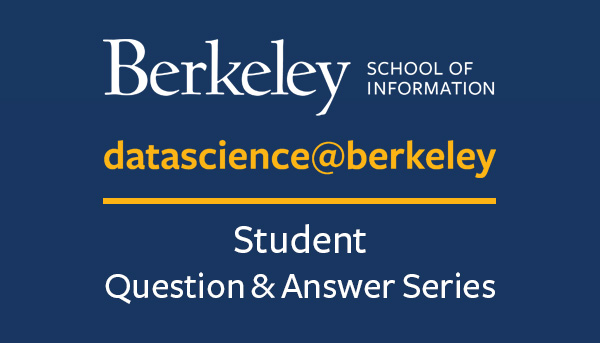datascience@berkeley Students Discuss How Data Science Will Affect Industries in the Future

Data science has become an integral part of critical decision-making processes, industry trends in the workforce, and even everyday life. With this in mind, we asked students working toward a Master of Information and Data Science (MIDS) degree in the datascience@berkeley program how data science will make an impact in the future and which industry they thought would be most affected. Below is a look at students’ responses.
Is there a particular industry — health care, retail, defense and security, etc. — where you see data science making a large impact over the next 10 years?
“I’d definitely put the professional sports industry up there. There is so much opportunity for data science to make a difference in how management runs its team, from optimizing in-game strategies to improving player performance and evaluating and negotiating contracts. I think we’re beginning to see some of this, but I’d bet that in 10 years the whole industry will look different, and that change will be driven by the development and adoption of data and data technologies.
I’d also be really surprised if data science hasn’t transformed health care 10 years from now. For the first time, we have popular consumer devices that can track our exercise, sleep, and nutrition. Right now that’s all they do — collect data and show it to us. As this trend develops, though, researchers and data scientists will actually be able to use this data to understand how all these lifestyle choices affect our health and make recommendations accordingly, and maybe even push those recommendations back to people through the same devices. This is a huge step forward from the current situation in which researchers use self-reported epidemiological data to make health claims and then publish this research in journals, where doctors might read it and possibly pass it on to patients.” – Carson Forter, datascience@berkeley student
“I’m most intrigued about the developments that will come from the field of health care, since there is both a tremendous opportunity and some heavy ethical challenges that we’re just starting to realize. On the one hand, I think there’s so much potential for precision medicine to revolutionize how we currently approach chronic — or potentially fatal — diseases. On the other hand, there are serious privacy concerns — not just for the individual but also his or her relatives, since genetic information is common among family members.
I’m only a few weeks into the MIDS ‘Legal, Policy, and Ethical Considerations for Data Scientists’ class, but one of the first readings we did was a profile of Yaniv Erlich, which discussed how he is able to identify individuals from their DNA information. After seeing the news about a federal government push for precision medicine, with a database of genetic information of at least a million people that will be completely anonymous. I find myself hoping that the government will go beyond simply storing the genetic material in a separate database from the participant information and will really focus on building a strong policy around the protection and use of that sensitive genetic data.
My hope for 10 years out would be to see an influx of privacy-minded data scientists in the medical field, simultaneously advancing the cause of precision medicine and evolving the policy of genetic data usage. I’m sure there will be some MIDS grads in the driver’s seat there!” – Sam Zaiss, datascience@berkeley graduate
“I don’t think a single industry is where we will see the greatest impact, but rather how data science across all industries comes together to affect our daily lives. From driving our cars to using our refrigerators or changing how we interact with our banks, the potential for data science to have an impact on our lives in the simplest of ways is huge.” – Elizabeth Peters, datascience@berkeley graduate
Want to learn more about the datascience@berkeley student body? View our class profile.
Citation for this content: datascience@berkeley, the online Master of Information and Data Science from UC Berkeley

